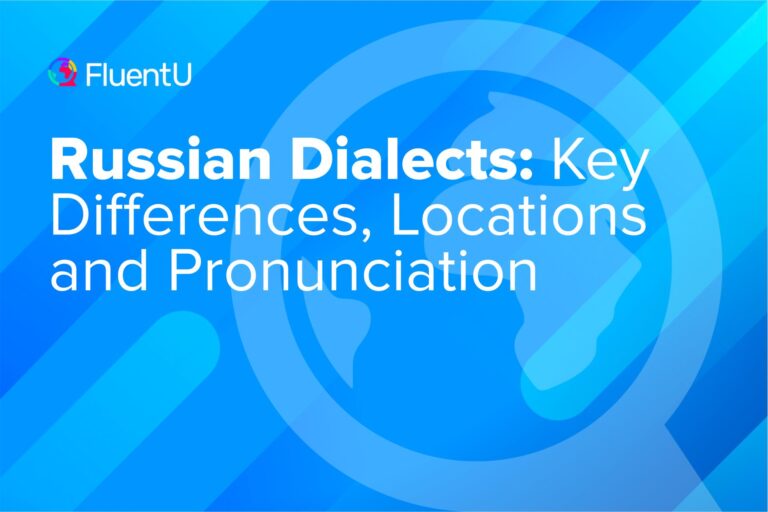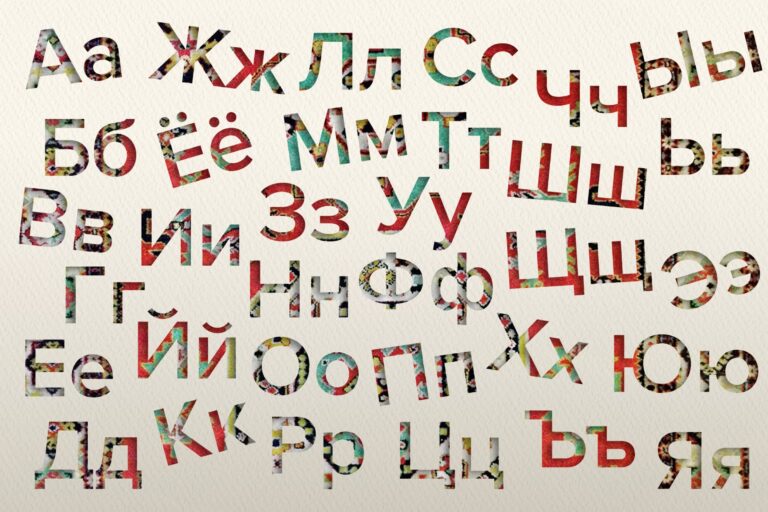Contents
- 1. The Simple No: Нет (No)
- 2. The Polite No: Нет, спасибо (No, thank you)
- 3. The Emphatic No: Конечно нет! (Of course not!)
- 4. The Categorical No: Ни в коем случае! (Not in any case!)
- 5. The “I Will Never” No: Ни за что! (Not for anything!)
- 6. The Apologetic No: К сожалению, нет (Regretfully, no)
- 7. The Resigned No: Да нет (Well, no)
- 8. The “Soon-to-be-yes” No: Ещё нет (Not yet)
- 9. The Interjection No: Не (Nah)
- 10. The Apparent No: Не похоже (It seems not)
- 11. The Non-committal No: Не уверен (Not sure)
- 12. The “Bad-timing” No: Не сейчас (Not now)
- 13. The Nonchalant No: Не-a (Naw)
- 14. The “I Know Better” No: Ну нет! (No way!)
- And One More Thing...
How to Say No in Russian: 14 Phrases
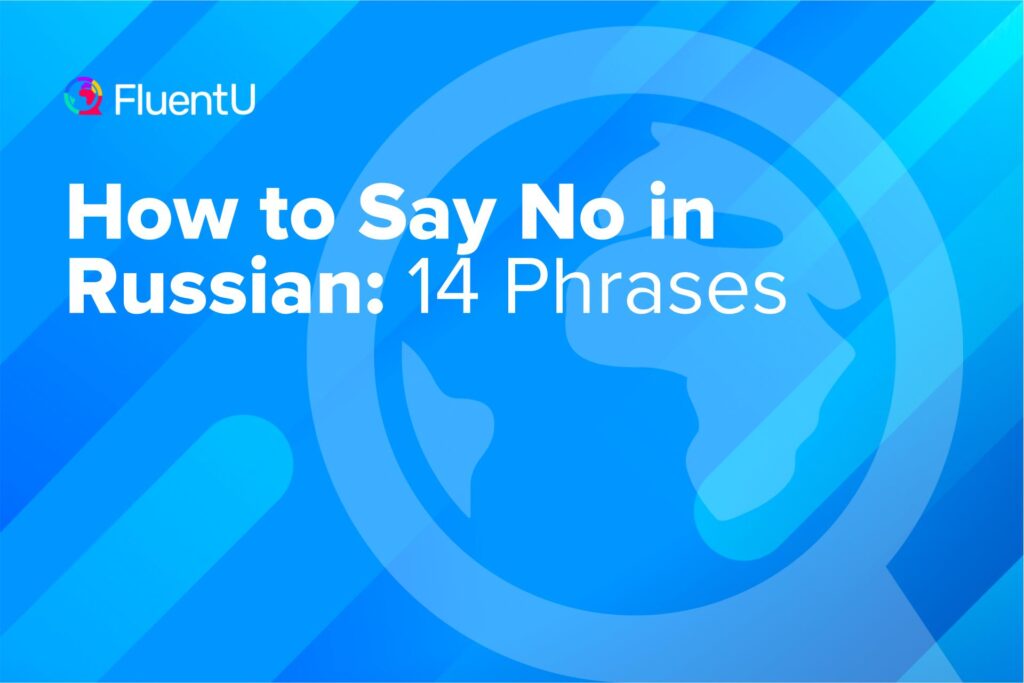
Whenever a situation calls for you to decline or disagree in Russian, your best friend is one of the first words that you learn in any language: “No.” The most basic way to say “no” in Russian is нет. However, while a simple “no” is oftentimes sufficient, more nuanced responses may serve you better in a variety of situations.
Have a look below at 14 different ways to say no in Russian.
Download: This blog post is available as a convenient and portable PDF that you can take anywhere. Click here to get a copy. (Download)
1. The Simple No: Нет (No)
This is the direct equivalent of the English “no,” which can be used in all kinds of situations. Just as in English, though, using this short word on its own may be considered brusque.
A simple нет is okay when responding to a complete stranger, but when directed to a friend or anyone to whom you expect to speak again, it is better to use one of the more extended forms below.
2. The Polite No: Нет, спасибо (No, thank you)
This is how you avoid sounding curt. It is universally applicable in situations where you want to decline an offer. When speaking to a stranger, it also sounds more assertive than the simple нет.
Would you like another drink? Нет, спасибо.
Can I interest you in our fine product line? Нет, спасибо.
Do you need help with that exam paper? Нет, спасибо.
You can also combine нет with извините (excuse me) to show politeness. It only works when responding to strangers with a clear desire of ending the line of inquiry there and then. With someone you know, always show politeness through gratitude.
3. The Emphatic No: Конечно нет! (Of course not!)
As in English, this form is applicable whenever the proposition appears to be self-evidently the opposite of what you think or would love to do.
Should we show up at her place unannounced? Конечно нет!
Would you like to spend the whole day on the couch watching movies? Конечно нет!
Have you had enough of our traditional family dinners? Конечно нет!
4. The Categorical No: Ни в коем случае! (Not in any case!)
This is an everyday form used to summarily dismiss an unacceptable course of action.
I only had a few drinks; I can still drive. Ни в коем случае!
Let’s take this badly-lit back-alley shortcut; I know the way. Ни в коем случае!
Should we skip that fireworks display on the riverfront? Ни в коем случае!
A similar sentiment is relayed by Ни при каких обстоятельствах! (Not under any circumstances!). This form is slightly more formal and carries an even stronger connotation of the proposition being dangerous, illegal or wildly inappropriate.
5. The “I Will Never” No: Ни за что! (Not for anything!)
This word construct is used for dramatic emphasis and is suitable for emotional statements such as “I will never let you go” or “I will never betray my friends.”
In a standalone fashion, it is more frequently applied in situations where a categorical rejection needs to be given with a connotation of “do not be silly.”
We are already late; can you skip your morning coffee? Ни за что!
Why don’t you throw away that old jersey? Ни за что!
6. The Apologetic No: К сожалению, нет (Regretfully, no)
As we saw before, using a standard word for “excuse me” when giving a negative answer expresses not much more than politeness and a desire to avoid further inquiry.
The actual regret for responding in the negative is more directly conveyed through the words that literally mean “to [my] regret.”
Will you come to visit us again this week? К сожалению, нет.
Can you stay longer? К сожалению, нет.
Are you free on Wednesday night? К сожалению, нет.
7. The Resigned No: Да нет (Well, no)
This strange-looking construct seemingly combines the Russian words for “yes” and “no,” but да in this instance has no affirmative value.
This form implies a measure of sadness that you have no choice but to answer negatively. Try to say the second word a few milliseconds longer than you normally would.
Will you try calling them again? Да нет.
Do you want to go to a bar? Да нет.
You can make your rejection sound even more tentative by using наверное (probably) after да нет. In a fairly well-known quirk of Russian spoken language, you can combine words for yes, no and maybe and arrive at the equivalent of “Well, probably not.”
Please keep in mind that a forcefully spoken Да нет! has a very different connotation—”nonsense!”—which may be acceptable between siblings or very tight friends but hardly beyond that. Be careful not to project this sentiment unnecessarily.
8. The “Soon-to-be-yes” No: Ещё нет (Not yet)
This is a direct equivalent of how you would express in English that right now your answer may be negative but in the future—whether near or far—it will turn affirmative.
Have you been to the Opera House before? Ещё нет.
Have you made a decision about my offer? Ещё нет.
Should we stop for food? Ещё нет.
9. The Interjection No: Не (Nah)
You may hear this shortened version of the simple “no” used by both friends and strangers, but standing on its own, it sounds a bit unrefined.
However, as an interjection in order to introduce a differing opinion or course of action, не works quite well between friends.
Let’s find a taxi ride. Не, лучше пройдёмся пешком. (Nah, I would rather we walk.)
Do you want to see another museum? Не, достаточно на сегодня. (Nah, enough for today.)
The full нет could also be used in these cases, but не flows better, so certainly try it.
10. The Apparent No: Не похоже (It seems not)
The just-introduced не in Russian is first and foremost a particle that turns anything into a negative. When combined with other words, it can produce fit-for-purpose answers.
This particular response implies that your ability to answer affirmatively is negated by circumstances.
Are you going to finish your exam paper in time for the party at Vlad’s house? Не похоже.
Can we find a ride home this late in the evening? Не похоже.
I want to go out; do you think the rain will stop soon? Не похоже.
11. The Non-committal No: Не уверен (Not sure)
This form indicates that you lean towards responding in the negative but leave the door open to turn that around. This is one form on this list that is gender-specific; a woman would say не уверена.
We are going to the exhibition on Saturday; do you want to join us? Не уверен.
Do you think you can be at my place by 7:30? Не уверен.
12. The “Bad-timing” No: Не сейчас (Not now)
Very similar to its English counterpart, this response implies that there are more important things to attend to right this moment, but that you will entertain the subject at a later date.
Can we discuss what kind of present we should buy for Lana’s birthday? Не сейчас.
Should we go over your grades this semester, young man? Не сейчас.
Let’s stop by and say hello? Не сейчас.
It may sound abrupt when used on its own, so you can soften it with пожалуйста (please) when speaking to people whose feelings you do not want to hurt.
You can also try не сегодня (not today) in similar situations. It gives a stronger sense that you cannot be bothered with the proposition and may even be understood as an oblique indication of “not ever.”
13. The Nonchalant No: Не-a (Naw)
This variation of the simple “no” can be useful when you want to project a bit of coolness.
Hungry yet? Не-а.
Wow, this is really high; aren’t you scared of heights? Не-а.
This only works with close friends. Distant acquaintances and strangers will likely interpret your use of не-а as childish and borderline irksome. Children do often use this form when behaving petulantly.
14. The “I Know Better” No: Ну нет! (No way!)
The literal translation of this phrase is “well, no”—same as for да нет, which we encountered earlier—but that does not relay the meaning of it. The closest equivalent in English is “Nope, I do not agree!” or more concisely, “No way!”
Said in a fairly assertive fashion, it means that the preceding statement made by your conversation partner is either wrong or unacceptable, and you are going to set them straight.
It practically never works as an answer to a question and never stands on its own—the setting-straight part is key.
I think we can walk there. Ну нет! Это на другом конце города! (No way! It’s all the way across town!)
Ronaldo is the best player in the world. Ну нет! Он никак не лучше Месси! (No way! He is not in the least better than Messi!)
I feel like we could have seen more sights today. Ну нет! Мы были в четырёх разных музеях! (No way! We went to four different museums!)
And now, go ahead and try these different forms of saying no in Russian wherever appropriate. Look for them in use through conversations and videos like the ones on FluentU.
FluentU takes authentic videos—like music videos, movie trailers, news and inspiring talks—and turns them into personalized language learning lessons.
You can try FluentU for free for 2 weeks. Check out the website or download the iOS app or Android app.
P.S. Click here to take advantage of our current sale! (Expires at the end of this month.)
Even if you still have a ways to go before you sound like a local, the simple act of using constructs beyond the basics will take you closer to that goal.
Download: This blog post is available as a convenient and portable PDF that you can take anywhere. Click here to get a copy. (Download)
And One More Thing...
If you love learning Russian and want to immerse yourself with authentic materials from Russia, then I should also tell you more about FluentU.
FluentU naturally and gradually eases you into learning the Russian language and culture. You'll learn real Russian as it's spoken by real Russian people!
FluentU has a very broad range of contemporary videos. Just a quick look will give you an idea of the variety of Russian-language content available on FluentU:
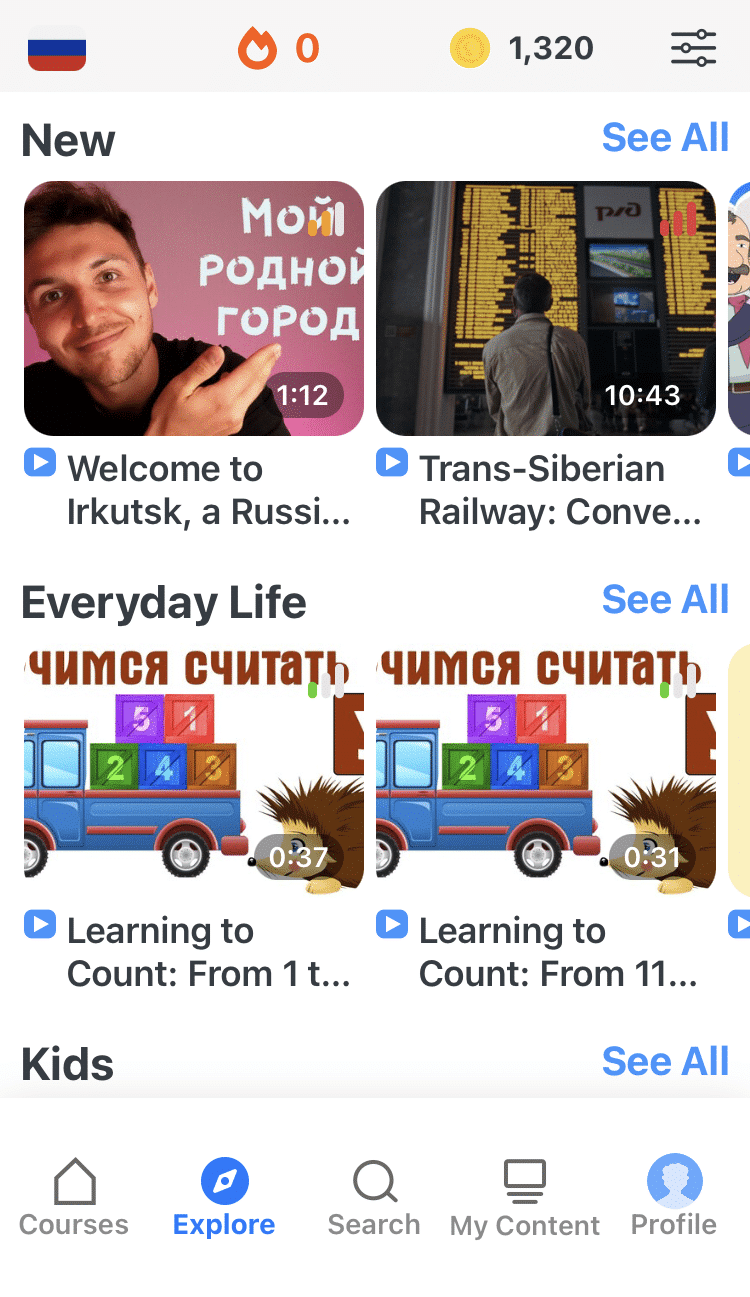
FluentU makes these native Russian videos approachable through interactive transcripts. Tap on any word to look it up instantly.
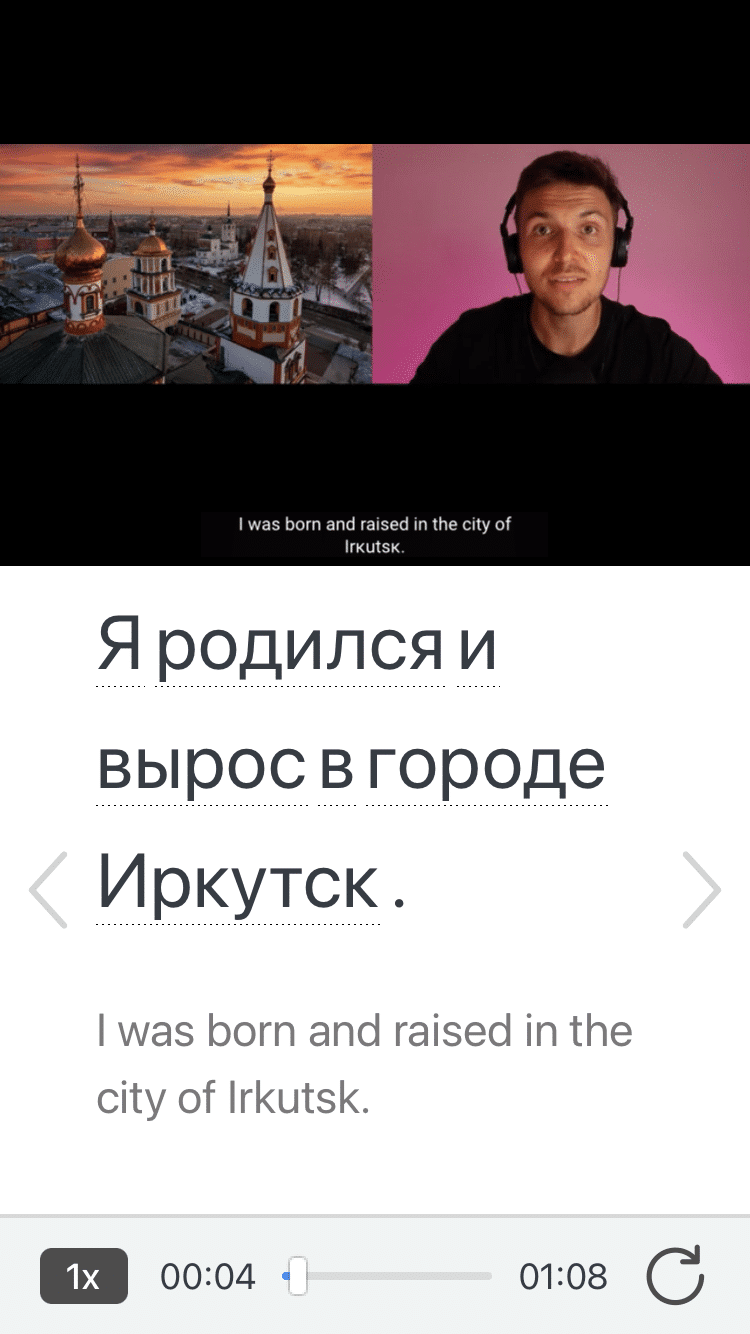
Access a complete interactive transcript of every video under the Dialogue tab. Easily review words and phrases with audio under Vocab.

All definitions have multiple examples, and they're written for Russian learners like you. Tap to add words you'd like to review to a vocab list.
And FluentU has a learn mode which turns every video into a language learning lesson. You can always swipe left or right to see more examples.
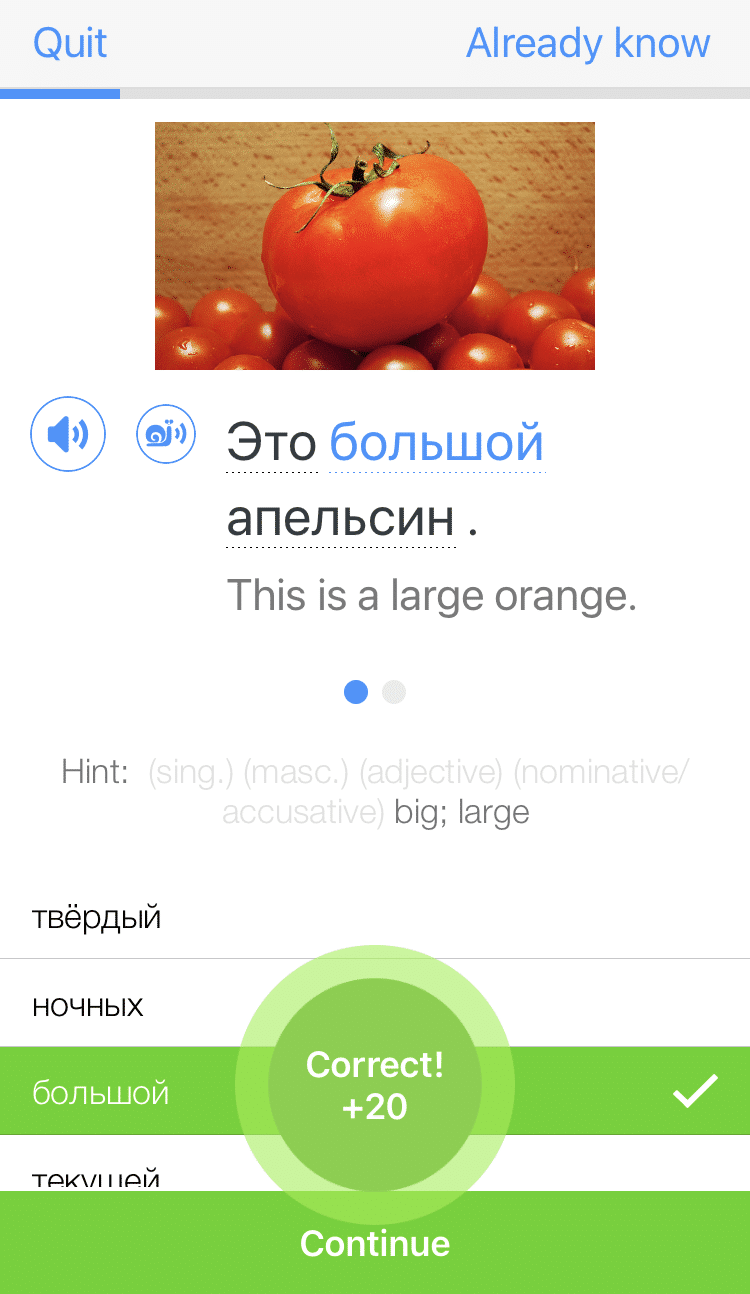
The best part? FluentU keeps track of your vocabulary, and gives you extra practice with difficult words. It'll even remind you when it’s time to review what you’ve learned. You'll have a 100% personalized experience.
Start using the FluentU website on your computer or tablet or, better yet, download the FluentU app from the iTunes or Google Play store. Click here to take advantage of our current sale! (Expires at the end of this month.)


